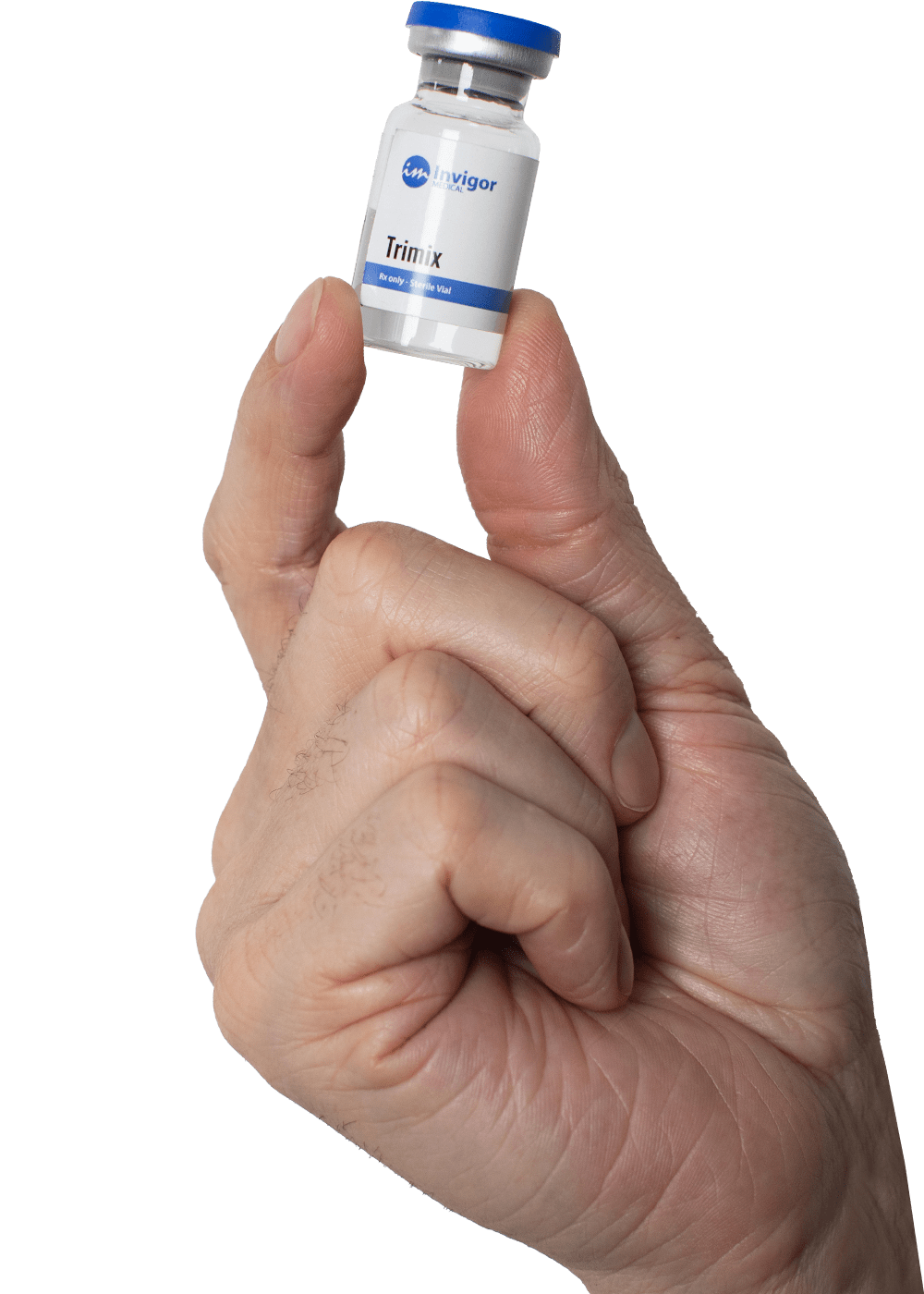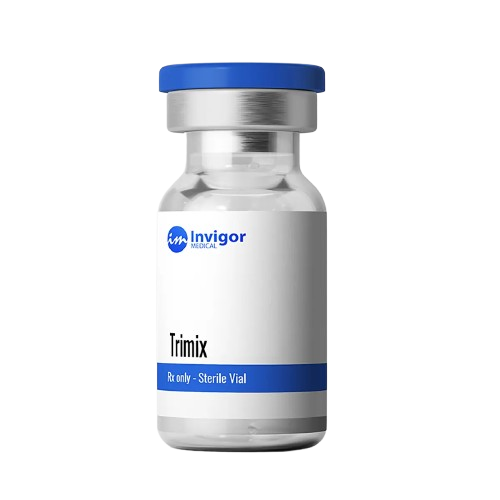If you’re wondering, “does Medicare cover Trimix injections for erectile dysfunction?”, the short answer is that Medicare does not typically cover these injections when prescribed solely for ED. This article will help you understand the specifics of Medicare coverage, exceptions, and what other options might be available.
Table of Contents
Introduction to Erectile Dysfunction
Erectile dysfunction (ED) is a widespread condition that affects millions of men, impacting both physical health and emotional well-being. Defined as the consistent inability to achieve or maintain an erection firm enough for sexual activity, ED can stem from a variety of causes. Common medical contributors include diabetes, high blood pressure, and heart disease, while psychological factors such as stress, anxiety, and depression can also play a significant role.
Fortunately, there are numerous treatment options available to help men manage erectile dysfunction. These include oral ED medications, such as sildenafil and tadalafil, which are often the first line of therapy. For those who do not respond to oral medications, injectable ED medications like Trimix offer an alternative approach. Other ED treatments may involve lifestyle modifications, counseling, or medical devices. Understanding the underlying cause of ED is essential for selecting the most effective treatment, and working with a healthcare provider can help tailor a plan that addresses individual needs and health conditions.
Medicare Coverage for Trimix Injections
Determining if Medicare covers Trimix injections is vital for those considering this ED treatment. Key points include:
- Medicare does not cover Trimix injections specifically for erectile dysfunction.
- ED injections like Trimix are generally excluded from Medicare coverage unless tied to other medical conditions such as diabetes or heart disease.
- Psychological causes of ED are not covered.
- Knowing the specific reasons behind the ED diagnosis is important.
Exceptions exist where some Medicare plans may cover ED treatments if prescribed for other medically accepted conditions, though not specifically for erectile dysfunction. Some insurance plans may offer limited coverage for certain erectile dysfunction treatments, but this is not typical for Trimix injections. Consulting with your healthcare provider to discuss your medical history and insurance plan details is crucial. Understanding what is covered can help avoid unexpected out-of-pocket expenses if your Medicare plan does not cover the treatment.
Consulting a doctor before beginning any ED treatment to discuss costs, coverage limitations, and treatment options is important. Insurance plans vary in their coverage of erectile dysfunction treatments, so patients should review their insurance plans for details. Medicare covers doctor’s visits related to erectile dysfunction, which can help to treat erectile dysfunction and navigate your treatment options.

Understanding Trimix Injections
Trimix injections are a powerful solution for men experiencing erectile dysfunction. Comprising three active ingredients:
- papaverine
- phentolamine
- prostaglandin E1 Trimix works by relaxing and expanding the blood vessels in the penis, leading to an erection. These ingredients increase blood flow to the penis, which is essential for achieving and maintaining an erection. The onset of an erection from Trimix typically occurs within 5 to 15 minutes after the injection, providing a quick and effective solution for ED. Unlike oral medications, Trimix can induce an erection without the need for sexual stimulation.
Administering Trimix involves injecting it into the side of the penis, and it is advised to alternate injection sites to prevent scarring. Trimix injections are self administered by patients after proper training from a healthcare provider. Many patients start with one dose of a low dose, usually around 15 units, which can be adjusted based on the effectiveness and the patient’s reaction to the treatment. Despite initial apprehensions about self-injecting, about 70% of men report high satisfaction with Trimix therapy and the various doses available, including the prescribed dose.
However, side effects such as temporary swelling, pain at the injection site, or bruising can occur with Trimix injections, and prolonged erections, known as priapism, require immediate medical attention if an erection lasts more than three hours.
Knowing these details can demystify the process and make potential users more comfortable with Trimix injections. Understanding the correct dose and proper administration techniques, such as using an alcohol wipe to clean the injection site before injecting and applying pressure to the injection site, can ensure safety and effectiveness for those considering this treatment. It is also important to dispose of used needles in a sharps container.
Medicare Part B and Injectable ED Medications
Medicare Part B covers diagnostic tests related to erectile dysfunction, offering a starting point for those seeking treatment. This includes initial visits and comprehensive evaluations, like penile ultrasounds and blood tests, which are crucial for understanding the underlying causes of ED. However, when it comes to injectable ED medications like Trimix, Medicare’s coverage is limited.
Prior authorization for Trimix prescriptions may be required, involving additional documentation from the prescriber. This can complicate the process, requiring patients to submit claims for reimbursement of their Trimix purchases. Medicare does not cover prescription ED medications if specifically prescribed for erectile dysfunction. Medicare prescription drug plans (Part D) may have different coverage rules for ED medications, especially if they are prescribed for medically accepted indications other than erectile dysfunction and meet FDA approval requirements. Additionally, Medicare Advantage plans may have their own policies regarding coverage for injectable ED medications, so patients should check with their specific plan for details. Understanding coverage limitations and requirements is crucial for accessing necessary treatments.
Being aware of the diagnostic tests Medicare covers and the steps required to secure authorization for medication and Medicare and Medicaid services is beneficial for those exploring injectable ED medications and oral medications. This knowledge can streamline the process and ensure that patients receive the appropriate care and support.

Compounded Medications and Medicare
Trimix is a compounded medication created by a combination of multiple drugs, a common ingredient, to meet the unique needs of a patient. Compounded medications like Trimix are used to treat ED when other options, such as oral medications, are not effective. These medications are typically available only through compounding pharmacies because they are prescribed off-label for ED treatment. The compounded nature of Trimix, however, presents challenges for Medicare coverage, as it is not FDA-approved for treating any specific condition. When considering options, it’s essential to trimix compare with other available treatments.
Most insurance providers, including Medicare, do not cover compounded medications created from bulk drug powders, such as Trimix injections. This lack of FDA approval and the compounded nature of the medication can significantly impact its insurance coverage. Patients relying on compounded medications from a compounding pharmacy might need to pay out-of-pocket, highlighting the need to explore all available financial assistance options.
Knowing these challenges is crucial for anyone considering Trimix injections. Understanding the hurdles associated with compounded medications can help patients navigate their treatment options and seek necessary financial support. The key takeaways from this understanding can significantly enhance the treatment experience.
Costs Associated with Trimix Injections
Trimix injection costs can vary widely, influenced by factors like insurance coverage and compounding fees. For patients with covered ED services, out-of-pocket costs include paying 20% after meeting the Medicare Part B deductible. However, compounding pharmacies often require payment upfront, as they typically do not accept insurance.
Several strategies can help reduce bleeding and the cost of Trimix injections:
- GoodRx coupons can significantly lower the price of ED medications, sometimes drastically compared to retail prices.
- Manufacturer copay cards may provide substantial savings for eligible patients.
- Patient assistance programs (PAPs) can help those with financial need access medications at reduced or no cost.
Additionally, shopping around for various suppliers can lead to better prices for erectile dysfunction devices, and using a flexible spending account (FSA) or health savings account (HSA) allows for tax-free spending on medical devices related to ED. These options make managing Trimix injection costs more feasible for many patients.
Trimix and Invigor Medical
Invigor Medical offers an accessible way to obtain Trimix injections through their online platform. They provide a streamlined process where patients can consult with licensed healthcare professionals remotely, making it easier to get a prescription for Trimix without frequent visits to a doctor’s office. Traditionally, patients would visit a doctor’s office for initial consultations, administration of ED treatments, and to receive instructions for proper medication management. Invigor Medical emphasizes patient convenience by offering discreet shipping and personalized dosing based on specific instructions from the healthcare provider.
The service includes professional guidance on how to self-administer the injections safely, including detailed instructions on injection sites—avoiding visible veins—and proper techniques to reduce risks such as air bubbles in the syringe. Patients can also receive ongoing support through Invigor Medical, ensuring that treatment is effective and side effects are managed appropriately. For more information on treatment options, you can compare Trimix injections vs other ED medications to determine which is best suited to your needs.
This approach can be especially beneficial for men who prefer privacy and convenience while managing their erectile dysfunction treatment. While Medicare does not cover Trimix injections, services like Invigor Medical help bridge the gap by providing affordable access to compounded medications—including Trimix injections—and expert care in men’s health.
Alternatives to Trimix Injections Covered by Medicare
Medicare does not reimburse for medications like Viagra or Cialis when prescribed directly for erectile dysfunction, but there are other treatment options covered under Medicare. For instance, penile implant surgery is an alternative that Medicare may partially cover if qualifying criteria are met. This includes the initial visit, full evaluation, and the penile implant treatment itself. Oral ED medications, such as Viagra and Cialis, are another alternative, though their coverage is limited under Medicare when prescribed specifically for ED.
Most Medicare Part D prescription drug plans may cover sildenafil when it is prescribed for certain conditions, such as pulmonary hypertension, rather than for erectile dysfunction. The copay for sildenafil typically ranges from $1 to $10, depending on the coverage stage. Coloplast devices may also receive partial coverage under Medicare, providing another alternative for those seeking ED treatments.
Exploring these alternatives provides viable options for those whose Medicare plans do not cover Trimix injections. Understanding the different treatments available helps patients make informed decisions that best meet their needs.
Steps to Appeal Medicare Denials
If Medicare denies coverage for your ED treatment, several steps can be taken to appeal the decision:
- Submit a Redetermination Request Form to appeal the coverage denial.
- Ensure the appeal is submitted within 60 days of the denial.
- Initiate the initial appeal within 65 days from the date of the denial notice provided by your Medicare plan.
Medicare provides five levels of appeal for coverage denials:
- Redetermination request to your plan.
- Reconsideration by an Independent Review Entity within 60 days if the plan’s initial decision is unfavorable.
- Hearing before an Administrative Law Judge for cases meeting a minimum dollar amount of $180.
- Appeal to the Medicare Appeals Council.
- Judicial review in federal court, each requiring specific request formats and minimum claim amounts.
In urgent cases where a decision could jeopardize your health, you can request an expedited review, which must be decided within 72 hours. Knowing these steps ensures you are well-prepared to advocate for your coverage needs.

Consulting Healthcare Providers
Consulting a healthcare professional before starting any treatment for erectile dysfunction, including Trimix injections, is essential. It is important to consult a qualified medical professional for ED treatment, as healthcare providers can evaluate your health status and offer personalized advice tailored to your specific circumstances. This ensures the chosen treatment is safe and effective for you.
Discussing with your doctor any other medications you are taking to avoid harmful interactions with Trimix is also crucial. Contacting your insurance provider directly can clarify coverage details for compounded medications like Trimix.
This comprehensive approach helps ensure that you receive the best possible care and support for your ED treatment.
Men’s Health and ED
Men’s health is closely linked to sexual health, and erectile dysfunction can be an important indicator of broader health concerns. Experiencing ED may signal underlying medical issues that require attention, making it crucial to consult a healthcare provider for a thorough evaluation. Healthcare providers are equipped to assess the potential causes of ED and recommend appropriate treatment options based on each patient’s unique situation.
Treatment options for ED are diverse and may include lifestyle changes such as improving diet, increasing physical activity, and managing stress. Medical treatments range from oral ED medications to injectable ED medications, each offering different benefits depending on the individual’s health profile and response to therapy. By discussing these options with a healthcare provider, men can make informed decisions about their care and find the most effective path to improving both their sexual health and overall well-being.
Additional Savings Options for ED Treatments
Several additional savings options for ED treatments can help make these therapies more affordable. Many clinics offer savings programs and financial assistance, significantly reducing the overall cost of ED treatments. Healthcare providers may offer installment payment plans for Trimix injections, which are used to treat patients, allowing them to manage expenses over time.
Coupons for Trimix injections and discounts on ED medications can be found through various sources:
- Online resources or pharmacy websites
- Some pharmacies that offer discounts on ED medications
- Patient assistance programs offered by pharmaceutical manufacturers, which provide medications at reduced costs to eligible individuals
- Non-profit organizations that may have programs to assist with ED treatment costs
Consulting a healthcare provider can lead to valuable information about available financial aid options, helping to reduce the financial burden of ED treatments. Exploring these savings options allows patients to access the treatments they need without undue financial strain.
Summary
Navigating Medicare coverage for Trimix injections and other ED treatments can be complex, but understanding the key points can help. Trimix injections, though effective, are not covered by Medicare for erectile dysfunction, emphasizing the need for alternative treatments and financial assistance options. Exploring alternatives like penile implant surgery and sildenafil, understanding the appeals process for coverage denials, and consulting with healthcare providers are crucial steps in managing ED treatment under Medicare.
By leveraging savings programs, financial assistance, and the expertise of healthcare professionals, patients can access the necessary treatments while managing costs effectively. Stay informed, consult with your doctor, and explore all available options to ensure the best possible outcomes for your ED treatment.
Frequently Asked Questions
Does Medicare cover Trimix injections for erectile dysfunction?
Medicare does not provide coverage for Trimix injections used for the treatment of erectile dysfunction. Thus, patients may need to consider alternative payment options for this therapy.
What alternatives to Trimix injections does Medicare cover?
Medicare may cover alternatives to Trimix injections, including penile implant surgery and sildenafil, provided specific medical criteria are met. It is important to verify coverage based on individual circumstances.
How can I appeal a Medicare coverage denial for ED treatment?
To appeal a Medicare coverage denial for ED treatment, submit a Redetermination Request Form within 60 days and follow the five levels of appeal if needed. Careful adherence to this process can increase your chances of a favorable outcome.
Are there any savings options for Trimix injections?
Yes, there are savings options for Trimix injections, including GoodRx coupons, manufacturer copay cards, and patient assistance programs. It is advisable to consult your healthcare provider for additional options.
Why are compounded medications like Trimix not covered by Medicare?
Compounded medications like Trimix are not covered by Medicare because they lack FDA approval for specific conditions, which affects their eligibility for insurance reimbursement.












